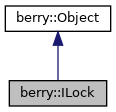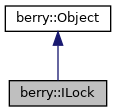#include <berryILock.h>


Public Member Functions | |
| berryObjectMacro (berry::ILock) | |
| virtual bool | Acquire (long delay)=0 throw (InterruptedException) |
| virtual void | Acquire () |
| virtual int | GetDepth ()=0 |
| virtual void | Release ()=0 |
 Public Member Functions inherited from berry::Object Public Member Functions inherited from berry::Object | |
| virtual QString | GetClassName () const |
| virtual Reflection::TypeInfo | GetTypeInfo () const |
| virtual QList< Reflection::TypeInfo > | GetSuperclasses () const |
| virtual void | Delete () |
| QDebug | Print (QDebug os, Indent Indent=0) const |
| virtual QString | ToString () const |
| virtual uint | HashCode () const |
| virtual bool | operator< (const Object *) const |
| void | Register () const |
| void | UnRegister (bool del=true) const |
| int | GetReferenceCount () const |
| void | SetReferenceCount (int) |
| void | AddDestroyListener (const MessageAbstractDelegate<> &delegate) const |
| void | RemoveDestroyListener (const MessageAbstractDelegate<> &delegate) const |
| virtual bool | operator== (const Object *) const |
Additional Inherited Members | |
 Public Types inherited from berry::Object Public Types inherited from berry::Object | |
| typedef Object | Self |
| typedef berry::SmartPointer< Self > | Pointer |
| typedef berry::SmartPointer< const Self > | ConstPointer |
| typedef berry::WeakPointer< Self > | WeakPtr |
| typedef berry::WeakPointer< const Self > | ConstWeakPtr |
 Static Public Member Functions inherited from berry::Object Static Public Member Functions inherited from berry::Object | |
| static const char * | GetStaticClassName () |
| static Reflection::TypeInfo | GetStaticTypeInfo () |
| static QList< Reflection::TypeInfo > | GetStaticSuperclasses () |
 Protected Member Functions inherited from berry::Object Protected Member Functions inherited from berry::Object | |
| Object () | |
| virtual | ~Object () |
| virtual QDebug | PrintSelf (QDebug os, Indent indent) const |
| virtual QDebug | PrintHeader (QDebug os, Indent indent) const |
| virtual QDebug | PrintTrailer (QDebug os, Indent indent) const |
 Protected Attributes inherited from berry::Object Protected Attributes inherited from berry::Object | |
| QAtomicInt | m_ReferenceCount |
| QMutex | m_ReferenceCountLock |
Detailed Description
A lock is used to control access to an exclusive resource.
Locks are reentrant. That is, they can be acquired multiple times by the same thread without releasing. Locks are only released when the number of successful acquires equals the number of successful releases.
Locks are capable of detecting and recovering from programming errors that cause circular waiting deadlocks. When a deadlock between two or more ILock instances is detected, detailed debugging information is printed to the log file. The locks will then automatically recover from the deadlock by employing a release and wait strategy. One thread will lose control of the locks it owns, thus breaking the deadlock and allowing other threads to proceed. Once that thread's locks are all available, it will be given exclusive access to all its locks and allowed to proceed. A thread can only lose locks while it is waiting on an acquire() call.
Successive acquire attempts by different threads are queued and serviced on a first come, first served basis.
It is very important that acquired locks eventually get released. Calls to release should be done in a finally block to ensure they execute. For example:
try {
lock.acquire();
// ... do work here ...
} finally {
lock.release();
}
Note: although lock.acquire should never fail, it is good practice to place it inside the try block anyway. Releasing without acquiring is far less catastrophic than acquiring without releasing.
- See also
- IJobManager::NewLock()
- Note
- This interface is not intended to be implemented by clients.
Definition at line 62 of file berryILock.h.
Member Function Documentation
◆ Acquire() [1/2]
|
virtual |
Acquires this lock. If the lock is in use, the calling thread will block until the lock becomes available. If the calling thread owns several locks, it will be blocked until all threads it requires become available, or until the thread is interrupted. While a thread is waiting, its locks may be granted to other threads if necessary to break a deadlock. On returning from this call, the calling thread will have exclusive access to this lock, and any other locks it owned upon entering the acquire method.
This implementation ignores attempts to interrupt the thread. If response to interruption is needed, use the method acquire(long)
◆ Acquire() [2/2]
|
pure virtual | ||||||||||||||
Attempts to acquire this lock. If the lock is in use and the specified delay is greater than zero, the calling thread will block until one of the following happens:
- This lock is available
- The thread is interrupted
- The specified delay has elapsed
While a thread is waiting, locks it already owns may be granted to other threads if necessary to break a deadlock. In this situation, the calling thread may be blocked for longer than the specified delay. On returning from this call, the calling thread will once again have exclusive access to any other locks it owned upon entering the acquire method.
- Parameters
-
delay the number of milliseconds to delay
- Returns
trueif the lock was successfully acquired, andfalseotherwise.
- Exceptions
-
InterruptedException if the thread was interrupted
◆ berryObjectMacro()
| berry::ILock::berryObjectMacro | ( | berry::ILock | ) |
◆ GetDepth()
|
pure virtual |
Returns the number of nested acquires on this lock that have not been released. This is the number of times that release() must be called before the lock is freed.
- Returns
- the number of nested acquires that have not been released
◆ Release()
|
pure virtual |
Releases this lock. Locks must only be released by the thread that currently owns the lock.
The documentation for this struct was generated from the following file:
